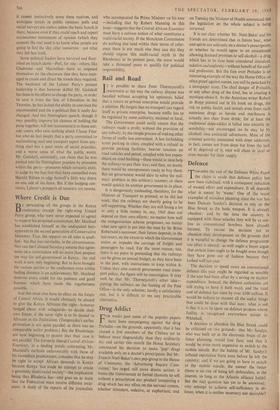Where Credit is Due
Bpersuading all the groups at the Kenya conference (except the right-wing United Party group, who were never expected to agree) to support his proposed constitution, Mr. Macleod has established himself as the undisputed heir- apparent in the second generation of Conservative Ministers. True, the support on all sides is quali- fied : but that was inevitable, in the circumstances. Nor can the Colonial Secretary assume that agree- ment on a constitution will do more than prepare the way for self-government in Kenya : the real work is now only beginning. But to have brought the various parties to the conference even within hailing distance is an achievement; Mr. Macleod deserves every credit for the patience and good humour which have made the togetherness possible.
And this must also have its effect on the future of Central Africa. It would obviously be absurd to give the Kenya Africans the right—however hedged about with safeguards—to decide their own future, if the same right is to be denied to Africans in the Federation. (Tanganyika's earlier promotion is not quite parallel, as there was no comparable settler problem.) But the Rhodesians are now beginning to protest that their case is not parallel. The formerly liberal Central African Examiner, in a leading article contrasting Mr. Macleod's methods unfavourably with those of his immediate predecessors, concedes that he may be right to accept African demands in Kenya because Kenya 'has made no attempt to create a genuinely multi-racial society'—the implication being that Rhodesia has—and goes on to insist that the Federation must receive different treat- ment. A study of the reports of the journalists who accompanied the Prime Minister on his tour —including that by Robert Manning in this issue—suggests that the Central African Examiner must have a curious notion of what constitutes a multi-racial society. If the Monckton Commission do nothing else (and within their terms of refer- ence there is not much else they can do) they should expose this multi-racial myth in the . Rhodesias; at its present pace, the count would take a thousand years to qualify for political responsibility.






































 Previous page
Previous page